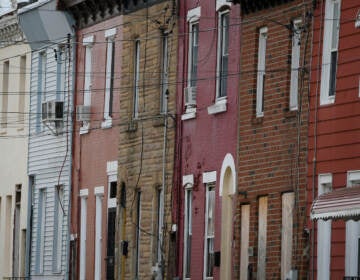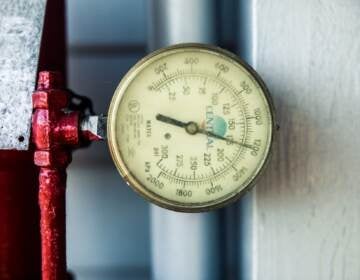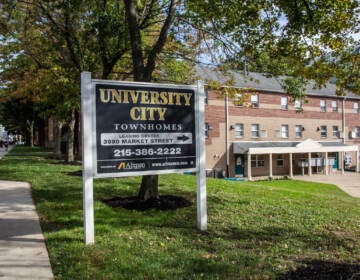Philly’s Latino doctors form a collective to boost lagging community vaccination rates
Inspired by the Black Doctors COVID-19 Consortium, a group of Latino physicians and nurses is applying for city funding to serve its undervaccinated community.
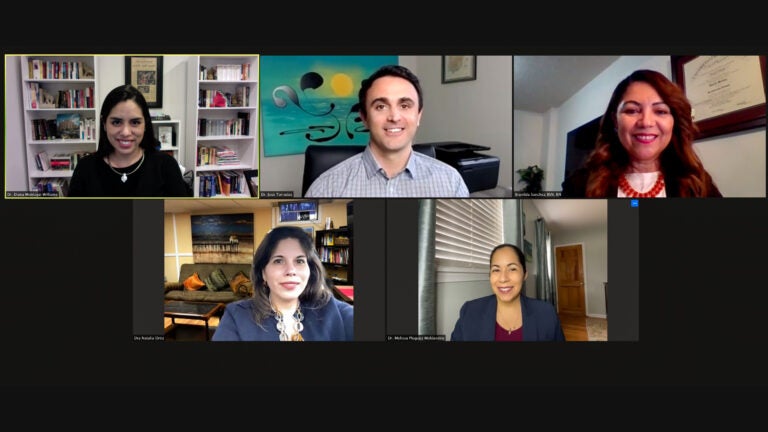
Clockwise from left, Diana Montoya-Williams, Jose Torradas, Brunilda 'Cookie' Sanchez, Natalia Ortiz, and Melissa Pluguez-Moldavskiy are members of Unidos Contra Covid. (Screenshot via Zoom)
Ask us about COVID-19: What questions do you have about the coronavirus and vaccines?
Inspired by the success of the Black Doctors COVID-19 Consortium, a group of Latino physicians and nurses is applying for city funding to provide vaccine access for Philadelphia’s significantly undervaccinated Latino communities.
Dubbing itself Unidos Contra COVID (United Against COVID), the group is among the organizations that has submitted an application in response to the Philadelphia Department of Public Health’s request for proposals for vaccine providers. They applied in early March and are awaiting a response any day. The group said it would aim to get vaccines to both Black and Latino Philadelphians.
“These historically marginalized groups have ample precedent to distrust traditional vaccination campaigns, and a consistent request from the people is the presence of vaccination centers located in the heart of their neighborhoods, staffed by people who are culturally and linguistically attuned to their needs,” the group wrote in its application.
While Black Philadelphians are underrepresented among those already vaccinated in Philadelphia, Latinos are being vaccinated at an even slower rate: Latinos make up 15% of Philadelphians, but less than 6% of those already vaccinated. Black people comprise 40% of the city’s population and just over 20% of those vaccinated.
Other cities that receive their own vaccine allotment from the CDC have had more success vaccinating Latinos in proportion to their population. In Chicago, which is 29% Latino, the vaccination rate for that group started, as it did in Philly, disproportionately low. As of March 10 though, 30% of Chicago’s vaccinations had gone to Latinos. In Washington, D.C., where the population is only 11% Latino, 9% of the district’s shots have gone to Latinos.
Latinos in Philadelphia have been particularly hard hit by COVID-19 as well, with higher death rates and hospitalization rates among the older adult population than any other racial or ethnic group.
“I think the pandemic has brought the perfect storm of risk factors to bear for the Hispanic community,” said Jose Torradas, who would serve as the group’s head physician. He noted that the prevalence of chronic conditions that make COVID-19 riskier, the high numbers of frontline jobs in those communities, and high incidences of congregate and intergenerational living settings have all added to the high rates of infection and death.
Getting shots into arms in the Latino community can be hard for a few reasons, including language access, transportation issues, and for those without documentation, fear of contact with government services. While the FEMA-run site at the Pennsylvania Convention Center does not require patients to be in the country legally and officials have said immigration status has no bearing on one’s eligibility, Torradas said that many in the immigrant community were still fearful to go.
“I love what they are doing at the Convention Center, but we need to be very honest when we ask ourselves, is the average abuelita going to travel miles from home to go to the Convention Center to get inoculated by somebody wearing military fatigues?” said Torradas. “To me, I struggle to see that.”
The Latino physicians collective is composed of five leaders: Dr. Natalia Ortiz, president of the Philadelphia County Medical Society; Diana Montoya Williams, a neonatologist at the Children’s Hospital of Philadelphia; and Dr. Melissa Pluguez-Moldavskiy, a nurse at Cooper University Health Care in Camden, who will head the nursing operation with the help of Cookie Sanchez. Torradas is an emergency physician currently working with IV Medical Diagnostics, a start-up that has been performing coronavirus testing throughout the pandemic.
The group proposes to run a mass vaccination center for six hours a day, three days a week Friday through Sunday, every other week for a total of 39 events and administering between 20,000 and 25,000 vaccinations total.
Unidos has identified two sites in areas badly affected by COVID-19 and where the groups’ founders have built relationships and performed testing operations already. One is at Concilio, a social services organization in North Philadelphia, and the other is at New Journey Christian Center in Northwest Philadelphia.
Unidos plans for every staff member on site to be bilingual, up through the medics and the security detail. The group is working with the Spanish American Law Enforcement Association, a contingent of Philadelphia police officers, to offer security on site.
The bulk of the administrative tasks for Unidos Contra Covid will be managed through IV, Torradas’ group. That group has the infrastructure in place to handle hiring, onboarding, clinical documentation, malpractice insurance, and billing services.
The group is requesting $767,700 from the city, including $70,000 for the medical director’s salary (Torradas) and hourly rates for six vaccinators, six translators, a site manager, four registrars, an on-site doctor, EMTs, and security. The budget also includes more than $30,000 for cold storage equipment and transport, which Torradas said wouldn’t be necessary if the group was allocated the Johnson & Johnson vaccine, which he hopes it is.
The group plans to bill insurance companies for the vaccine administrative fee, which the Biden administration recently raised from $28 to $45 for a single dose and $45 to $80 for a two-dose regimen, in order to incentivize providers to administer more doses. Any proceeds from the project that are not reinvested into community vaccination and testing efforts will be directed toward developing the business, according to the application.
There are existing organizations targeting Philadelphia’s Latino population like Esperanza Health Center and Congreso, but many of them do not have the capacity to provide the vaccine on a large scale, said Torradas. He said he hopes Unidos Contra Covid can serve as a place where those grassroots organizations, already tapped into the Latino communities, can send patients and scale up.
“I met with the executive boards of many of these groups and it is, ‘We have the staffing to barely run our day-to-day operation, how are we logistically going to go to a 500-a-day vaccine center with what we’ve got?’ And nobody seemed to have a good answer to that.”
City data bears out those trends. Esperanza Health Clinic ordered 5,000 shots as of the week of March 7, but had only administered 1,398 of them. Congreso had only ordered 200 doses but hadn’t administered any of them.
The groups on the ground say a reliable, convenient place to send their community members to get vaccinated is sorely needed.
Esperanza Health Clinic is doing its best to administer vaccines, said Debra Ortiz-Vasquez, the clinic’s Director of Community Health and Wellness, but it’s difficult to scale up a vaccine operation when you have to do the work of treating hard-to-reach patients, and also have to continue running the daily operations of a health clinic. In a highly regulated federally qualified health center like Esperanza, you can’t just hire a batch of vaccine administrators and scale up your operation, she said.
“We’re getting there,” said Ortiz-Vasquez, who noted that in addition to slowly vaccinating its patients, the group has done a couple of Saturday community vaccine events where they’ve inoculated more than 100 people at a time. “We’re hoping to do more, but it is cumbersome.”
She said it would be great to be able to have someplace trustworthy and nearby to send people who were interested in the vaccine.
“Right now, it feels like we are sending them into the abyss,” she said.
Rev. Luis Cortés Jr., founder, president, and CEO of Esperanza (a separate entity from the health clinic by the same name), which provides social services to Latinos in Philadelphia, said when someone comes to his organization looking for a vaccine, he tells them to call 311. Esperanza Health Clinic has reached out to his group once saying they had vaccines to offer, but it’s not a consistent flow of slots. The city gave Cortés’ group 500 spots at the FEMA site at the Convention Center, but there is no consistent place in the neighborhood where he can send people.
“I feel confident that once we set up systems within the neighborhood, the community will catch up,” he said. The reverend said he’s worked with members of the Unidos coalition on testing events and would be excited to welcome them to the neighborhood. Still, he wishes the city would have been more proactive and sooner.
“At the end of the day, the African American community had to organize itself,” he said. “The Hispanic community had to organize itself. What does that tell you?”
 WHYY is one of over 20 news organizations producing Broke in Philly, a collaborative reporting project on solutions to poverty and the city’s push towards economic justice. Follow us at @BrokeInPhilly.
WHYY is one of over 20 news organizations producing Broke in Philly, a collaborative reporting project on solutions to poverty and the city’s push towards economic justice. Follow us at @BrokeInPhilly.

Get daily updates from WHYY News!
WHYY is your source for fact-based, in-depth journalism and information. As a nonprofit organization, we rely on financial support from readers like you. Please give today.


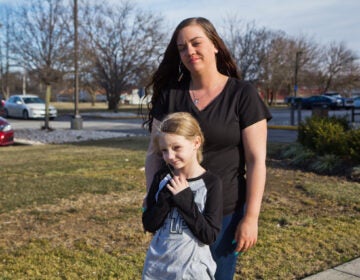
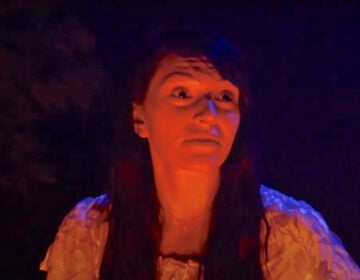
![CoronavirusPandemic_1024x512[1]](https://whyy.org/wp-content/uploads/2020/03/CoronavirusPandemic_1024x5121-300x150.jpg)

